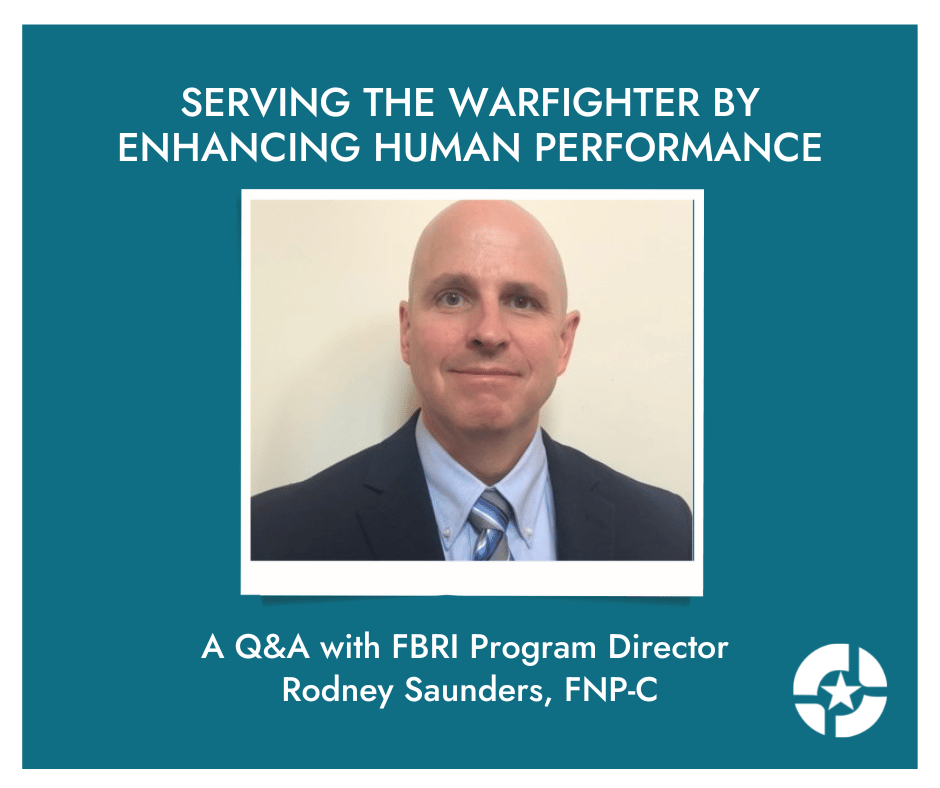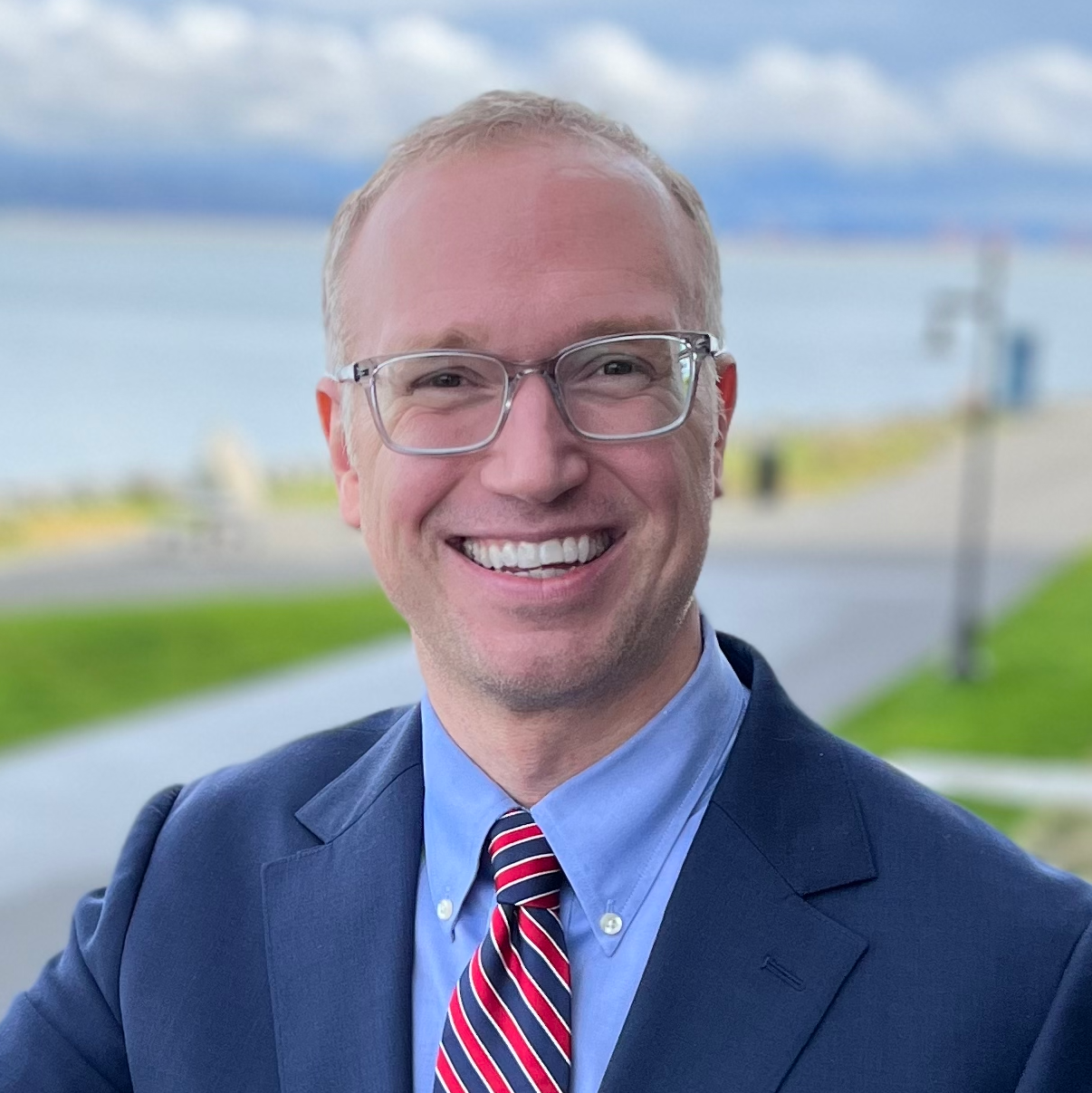22 February 2023
Serving the Warfighter by Enhancing Human Performance: A Q&A with FBRI Program Director Rodney Saunders, FNP-C
MAJ Rodney Saunders, FNP-C has proudly been a nurse for 22 years and has served in uniform for the past 25 years with service as an Enlisted Rifleman/Machine Gunner in the U.S. Marine Corps Reserve and as an Emergency Nurse, En Route Critical Care Nurse, and Nurse Practitioner in the U.S. Army Reserves.
Rodney Saunders is the new Project Director for the Fort Bragg Research Institute (FBRI), a program of The Geneva Foundation, where he will continue supporting the Warfighter through human performance research management. As a Project Director, Rodney will lead FBRI initiatives across Ft. Bragg, including supporting the Warfighter Brain Health Initiative with the North Carolina Center for Optimizing Military Performance (NC-COMP). Rod’s primary role is to support the U.S. Army Special Operations Command’s (USASOC) Human Performance and Wellness initiative as a member of the USU-4D Bio3 Center for Biotechnology team
Before joining Geneva, Rodney served on active duty at Headquarters, USASOC from 2015-2019 and again from 2020-2022 supporting operational medicine and research initiatives for the Deputy Chief of Staff, Surgeon. He has served in various clinical roles as a civilian with Veterans Health Affairs, The Ohio State University Wexner Medical Center, and as Deputy Incident Commander (COVID-19 Response) for the University of Maryland Medical System.
We spoke to Rodney about his experience and what he’s looking forward to working on in his new role with FBRI and Geneva.
Please share a little bit about your background as a nurse.
I entered the profession 22 years ago as a new registered nurse (RN) graduate in the Emergency Department (ED). I then obtained my Bachelor of Science in Nursing from Ohio University and my Family Nurse Practitioner degree from the University of Cincinnati. It was the environment of the ED that initially attracted me to the profession. In the ED, each day is a new challenge, and you literally must be a “jack of all trades.” You must possess the ability to be a highly functioning member of a multidisciplinary team because you never know what is coming through the door. One moment you are treating a heart attack, an injured football player, or stabilizing a sick infant. The next minute you could have a multiple casualty trauma event, or you are consoling a grieving family. I fell in love with the breadth of knowledge and experience needed to work in that environment.
My civilian career has provided experiences in different settings like small community emergency departments, a regional level one trauma, burn, and stroke center, Veterans Affairs, and COVID-19 pandemic response. Currently, I continue to see patients as a Reserve member of the 1st Special Forces Command and USASOC at Womack Army Medical Center on Fort Bragg.
Why did you decide to pursue military medicine as a career?
After finishing my enlistment in the Marine Corps and becoming a nurse, I wanted to continue serving the nation, so pursuing a career as an Army Nurse Corps Officer was an easy decision. I initially accepted a direct commission into the Army Reserve as an Emergency Nurse with a Combat Support Hospital (CSH) and then eventually became a Family Nurse Practitioner.
What additional research areas interest you?
My operational experience while deployed during the Global War on Terror and my active-duty assignments with the U.S. Army Special Operations Command (USASOC) have given me unique insights into combat casualty care, CBRNE, and human performance, specifically optimizing Warfighter lethality. Our Warfighters must be enhanced to perform in any domain, meet the operational demands placed upon them, and have access to the best point of injury, en route, and facility-based care in the world.
What are you most looking forward to by joining FBRI and Geneva?
First and foremost, I am excited to continue serving the Warfighter. I look forward to leveraging Geneva’s vast capabilities, resources, and collaborations to help commanders solve their most complex challenges and emerging threats while advancing military medicine.
Disclaimer: The views expressed do not reflect the official policy of the Army, the Department of Defense, or the U.S. Government.

"Our Warfighters must be enhanced to perform in any domain, meet the operational demands placed upon them, and have access to the best point of injury, en route, and facility-based care in the world."
Rodney Saunders, FNP-C


